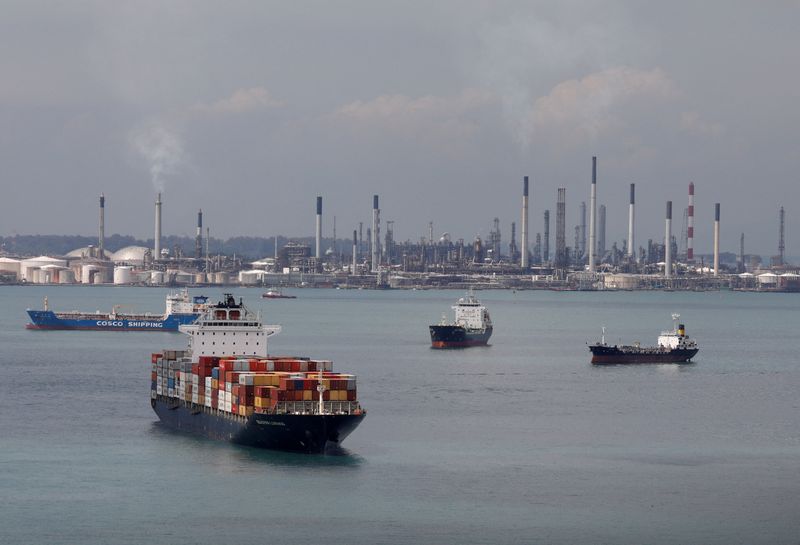By Trixie Yap
SINGAPORE (Reuters) - Oil giant Shell (LON:SHEL) said on Wednesday that it has agreed to sell its Bukom refinery in Singapore - one of the world's largest oil refining and trading centres - to a joint venture of Indonesian chemicals firm PT Chandra Asri and global trading house Glencore (OTC:GLNCY), culminating a process that began last year.
Here are the key details and what's next:
WHY IS SHELL SELLING ITS SINGAPORE "CROWN JEWEL" REFINERY?
The sale of the complex, which opened in 1961, is part of CEO Wael Sawan's plan to reduce the company's carbon footprint and to focus on its most profitable businesses.
Last year, Shell said it was conducting a strategic review of its Singapore assets.
WHO ARE THE BUYERS?
Chandra Asri is majority owner of the joint venture with Glencore, called CAPGC Pte. Ltd. (CAPGC).
Chandra Asri operates Indonesia's sole naphtha cracker which can annually produce 900,000 tons of ethylene and 490,000 tons of propylene, which are basic raw materials that are processed into other petrochemicals. It is a joint venture between several Thai and Indonesian firms including Siam Cement Group, Thai Oil and PT Barito Pacific.
Glencore is a Swiss-based producer and marketer of commodities such as copper, cobalt, zinc, nickel and ferroalloys. It markets aluminium and alumina and iron ore, and trades oil and fuel products.
WHAT IS BEING SOLD?
Shell's Bukom refinery complex includes several crude distillation units with total processing capacity of 237,000 barrels per day (bpd) and a 1 million-ton-per-year steam cracker.
Its Jurong Island facility has other derivative petrochemical units making products such as monoethylene glycol and styrene, which are key feedstocks for the polyester and plastic industries.
The deal is set to close by year-end, pending regulatory approval.
HOW WILL THE DEAL AFFECT REGIONAL TRADE IN CRUDE OIL AND REFINED PRODUCTS?
Glencore will likely provide cashflow for Chandra Asri's procurement of crude oil feedstock for its Bukom operations and take refined fuel products such as gasoline, diesel and jet fuel either for its own contract deliveries or for spot sales, a source with direct knowledge of the matter said.
"It's very typical for a trading house to provide trade finance to refiners and in return they get paid by cargoes. This way, a trading house can secure long-term stable product supply," said Beijing-based director of downstream consulting at S&P Global Commodity Insights Harry Liu.
Glencore declined to comment.
It is likely that the refinery will continue to process mostly sour crude as it is a "fairly complex refinery with a residual fluid catalytic cracker, a mild hydrocracker and a vacuum gas oil desulphurisation unit", unless the economics favour sweet crude, said FGE head of Asia refining Ivan Mathews.
In the longer run, however, there could be a shift in focus from fuel production to chemicals instead because of economics.
"The site produces about 60% transport fuels and about 14% chemicals. Given the long-term value add from chemicals, we could see a deeper shift from transport fuels to chemicals at the site. But this will depend on how discussions work out between Chandra Asri and Glencore," said Wood Mackenzie's research director Sushant Gupta.
From the downstream portion, Chandra Asri is likely to take naphtha from the Bukom facility to feed its steam cracker, according to a source directly involved in the matter as well as analysts.
"The ownership of Shell's refinery will give (Chandra Asri) additional flexibility in feedstock sourcing. Chandra Asri can also tap into Glencore's logistical capabilities to improve the synergy between the two manufacturing sites," said Wood Mackenzie principal analyst Catherine Tan.
Chandra Asri may also opt to shelve an earlier cracker expansion at its Cilegon site, instead using the newly acquired Jurong Island site as its second complex, two sources familiar with the plant operations added.
"While we are not expecting any immediate impact to supply/demand in the near to medium term as the deal will take some time to close, the deal will likely impact Chandra Asri’s plans for CAP2, which could be shelved," Tan said, referring to a second naphtha cracker.
Chandra Asri did not immediately respond to a request for comment.
WHICH OTHER REFINERIES STILL OPERATE IN SINGAPORE?
ExxonMobil (NYSE:XOM) operates a 600,000-bpd refining site in Jurong Island and Tuas, while Singapore Refining Co has a 290,000-bpd refinery at Jurong Island.
WHAT OTHER ASSETS DOES SHELL HAVE IN SINGAPORE?
Shell says it owns "over 57" retail fuel stations in the city-state, and has stakes in two petrochemical plants, the Petrochemical Corp of Singapore (PCS) and the Polyolefin Company (TPC) Singapore.
(This story has been corrected to remove '800,000-tpy steam cracker' from Jurong Island facility in paragraph 9)
